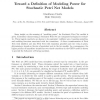Free Online Productivity Tools
i2Speak
i2Symbol
i2OCR
iTex2Img
iWeb2Print
iWeb2Shot
i2Type
iPdf2Split
iPdf2Merge
i2Bopomofo
i2Arabic
i2Style
i2Image
i2PDF
iLatex2Rtf
Sci2ools
PNPM
1987
1987
Toward a Definition of Modeling Power for Stochastic Petri Net Models
Some insight on the meaning of "modeling power" for Stochastic Petri Net models is given. Extensions characterizing a Stochastic Petri Net are categorized as logical or stochastic. Three logical constructs are shown to be equivalent: inhibitor arcs, transition priorities, and enabling functions associated with the transitions. A direct transformation of Petri Nets with inhibitor arcs into Petri Nets with transition priorities and vice versa is given, determining a bound on the size of equivalent nets in the two models. As a consequence, the higher priority of immediate transitions over timed transitions in the GSPN model is shown to provide the full power of Turing machines.
Related Content
| Added | 28 Aug 2010 |
| Updated | 28 Aug 2010 |
| Type | Conference |
| Year | 1987 |
| Where | PNPM |
| Authors | Gianfranco Ciardo |
Comments (0)

